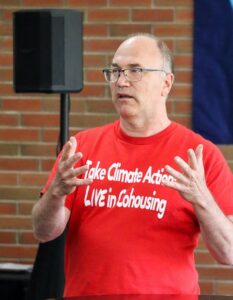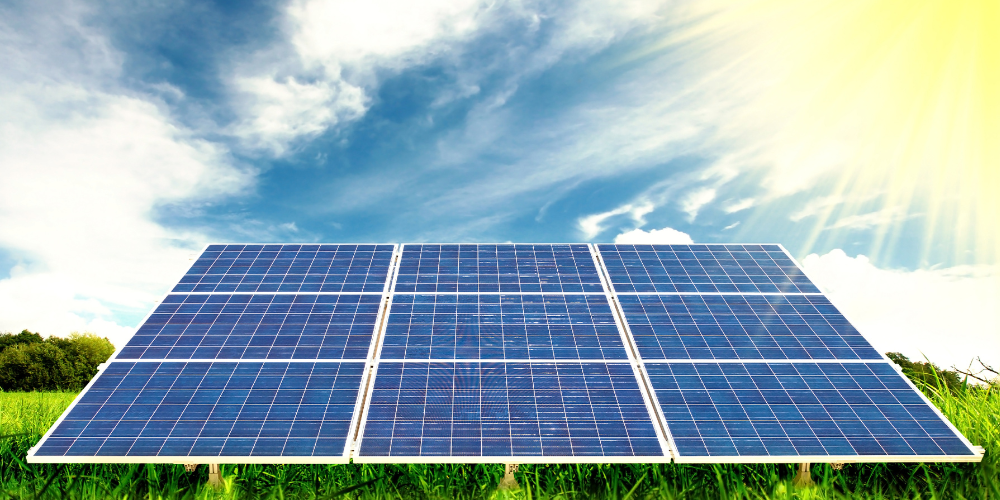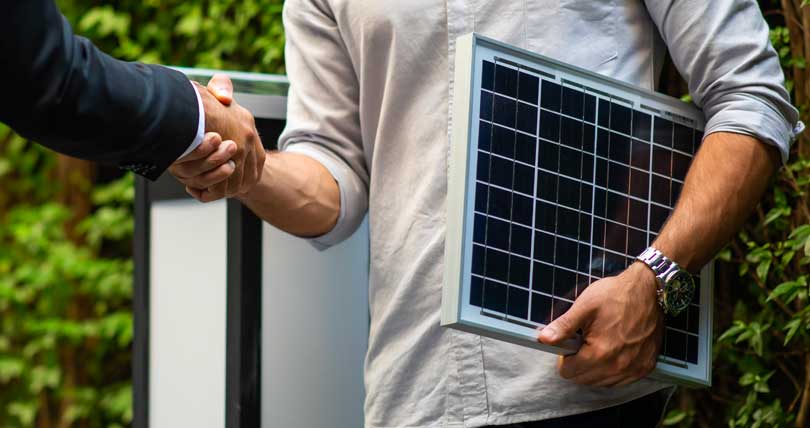In June, 2009, Roger Gagne learned that a small anti-nuclear group in Lethbridge had made a presentation to City Council that said, “The Province just spent $250,000 on a task force studying nuclear energy for Alberta; could you write them asking they do the same for renewable power?” And Lethbridge City Council agreed. Inspired by this, Roger wrote to and phoned 80 Mayors across Alberta and, with similar advocacy by local activists across Alberta, he saw 12 municipalities write to the Premier’s Office echoing the same request. We didn’t get the Task Force, but the Province launched the Municipal Climate Change Action Centre which continues today to assist municipalities in energy audits and projects improving energy efficiency or installing renewable power. On Earth Day 2022, with sound advice and editing assistance from two recovering politicians and two independent climate activists in Calgary, Roger launched the Climate Plan Alberta website. Roger was kind enough to take some time and chat with us about his website and the work he is doing.
 Green Alberta Energy: What is Climate Plan Alberta?
Green Alberta Energy: What is Climate Plan Alberta?
Roger Gagne: A non-partisan chorus of Alberta organizations calling for a robust and credible climate plan from our Provincial Government.
GAE: What inspired you to start the Climate Plan Alberta website?
RG: Four days before the COP26 climate conference in Glasgow in late 2021, Premier Jason Kenney said, “We’re not going to that gabfest in Scotland, but in a few months time we’ll have a new climate plan for Alberta.” Knowing that our Province is the only one with rising GHG emissions while others are falling, knowing that we have decades of setting tepid climate goals and failing to meet even those (with the exception of Notley’s Climate Leadership Plan, which, largely, was bold at the time, and which has largely continued to meet its targets) I knew that in Alberta, any party in Government would need pressure to set and to meet substantive climate goals. For four months, I wondered what could be done, and I talked to everyone I could who had thoughts on this until finally at 1:00 AM on March 29th last year I realized, “Oh, of course; it needs to be an open letter from a broad collection of signatories”.
GAE: On the website, you urge the Alberta government to simply make a credible plan. What are some things you would like to see included in a plan?
RG: Personally, I’m a big fan of rooftop solar and energy efficiency. We lag behind every Canadian Province and some 45 US States in terms of our energy efficiency. I’d also love to see some geothermal power projects finally get built in Alberta. We need to look at the big picture of the accelerating climate crisis (which was evident in our early and huge start to our wildfires this year), the need to dramatically cut emissions by 2030, and the energy transition which is already enabling willing companies, communities and jurisdictions around the globe to develop fossil-free transport, heating and cooling, and industries. Neither I nor any of our signatory partners, however, are either economists or energy experts. Any plan set forward by Government should seek the endorsement of the many experts (including their in-house policymakers) who follow these things closely and who can assess the steps necessary in all sectors, from agriculture to power generation to the oilsands.
GAE: Your site does a great job of encouraging bigger groups like Municipalities, Businesses, Non-Profits and more to advocate the Alberta government in terms of facing climate change. What can the average person do to contribute?
RG: Talk about it! Write or call your MLA, your MP, your Town or City Councillor. Write a Letter to the Editor of your local newspaper. Write your bank or investment firm, to voice your concerns about investments in new fossil fuel infrastructure. Ask the owner or manager of your favourite restaurant, bike shop, yoga studio, home builder or micro-brewery, ask a member of the social justice committee in your church, mosque, or synagogue if the words “climate change” ever crossed their mind as they stayed inside to avoid the smoke, or as they watched the news last month about 30,000 Albertans evacuated from their homes. If they answer “Yes,” then ask them to visit climateplanalberta.ca and consider signing on in this growing chorus.
GAE: Our industry had originally set a goal of being net zero by 2035, then the UCP government recently announced that their target is 2050, in keeping with most other jurisdictions. What is Climate Plan Alberta hoping to see from the power and utilities industry?
RG: A recognition that 2050 is too late. Also, a step away from our siloed approach to electricity which has us entrenched in distrust of our provincial neighbours. Alberta and BC, Saskatchewan and Manitoba, Quebec and Ontario; each of these Provincial pairs can benefit from more transmission between their electricity grids, and there is federal money on the table to build these linkages.
GAE: The estimated cost of becoming net zero has ranged from $42 billion all the way up to $100 billion. How do you envision industries and governments getting that kind of investment? RG: First of all, from a recognition that the cost of climate inaction is far higher. Secondly, a recognition that the cost of cleaning up inactive wells and oilsands tailings ponds, and dealing with unusable assets left stranded by a world rapidly transitioning from fossil fuels, is far higher. Finally, we used to have provincial control over our carbon tax revenue, but we handed that over to the Federal Government. We could take back the power to decide how to spend that money, as several other Provinces do. We could spend it wisely in adapting to and participating in the energy transition.
GAE: Renewables are fast becoming a significant player in Alberta’s generation mix, but the intermittency issue remains a barrier. What are you hoping to see from a provincial standpoint to address that?
RG: Who knew that we already have some 100 MW of battery storage capacity in Alberta? I didn’t until one day close to Christmas last winter when high demand driven by cold temperatures took us to the edge of rolling brownouts. Costs of battery storage are still falling, while dozens or even hundreds of companies are developing new energy storage systems with weights, flywheels, and heat transfer into rock or sand. Let’s set our low-carbon targets, create sensible laws and regulations to clear the path, and watch the engineers build out elegant solutions appropriate to our own particular energy grid.
GAE: Our Hummingbird Virtual Solar Community now rivals many of the utility-scale solar farms. What would you say to residential homeowners who are thinking of putting solar on their homes?
RG: Of course, solar panels need a good roof to sit on. But if your roof is in good shape, or if you’re upgrading your roof anyway, the cost of solar has come down so far that it has become a no-brainer choice even if your roof doesn’t face south. And over the course of a year, our own solar panels at my home make more money for us than what we pay for electricity. Getting this work done will support local businesses, maintain good local jobs, and will cut down on expensive long-distance transmission costs.
GAE: What are your hopes from members of our Solar Club?
RG: Many Solar Club members are already attentive to issues around energy and climate. I applaud their choice to vote with their dollars and their contracts to support community-based renewable power in this Province we love. I urge them to remember that innovation and leadership have always existed in pockets dotting across Alberta and that we need to hold to the hope and the confidence that we can rise to the challenges of today.
If you are a microgenerator in Alberta, congrats! You’ve already taken the first steps towards effecting change on the issue of climate change. On top of that, you’ve made an investment that can lead to a reduction your electricity bills. If you haven’t joined the Solar Club yet, you’re missing out on a ton of added benefits that can help you maximize the ROI on your investment.




